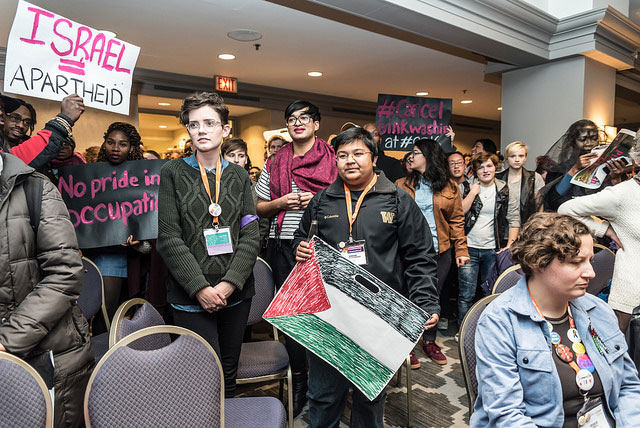
As a queer Jewish activist who supported the protest and demands that the National Gay and Lesbian Task Force cancel the reception sponsored by the Israel advocacy group, A Wider Bridge, at the Creating Change conference, I am appalled but not surprised by the accusations and misconceptions that are being spread about the protesters, the LGBTQ left and the Palestine solidarity movement as a whole.
What onlookers should know about these accusations, particularly around anti-Semitism, is that they are nothing new. They get trotted out every time we peel back the rainbow sticker to draw attention to pinkwashing – the cynical use of LGBTQ rights in Israel to cover up and justify Israeli apartheid and occupation. Pro-occupation commentators purposefully confuse the issue by using telescopic vision to zoom in on one piece of the controversy in order to obscure the larger power dynamics. By accusing the protesters of anti-Semitism, these critics can position the organization and people who are aligned with a powerful state, Israel, as the protesters’ victims.
Focusing excessively on tactics is part of their effort to distract attention from the real issue that the protest highlights: the increasing insistence on including Palestine in all of our struggles for social justice.
So let me state clearly: The central problem we face in the LGBTQ community is not anti-Semitism, but a crucially important struggle over what kind of LGBTQ agenda we want to move forward. Will we align ourselves with state power and happily mingle with those who justify the actions of an apartheid state at our conferences? Or will we keep challenging these abuses of power every chance we get?
A little bit of queer history is in order. In the 1960s and 1970s in the United States, gay liberation movements grew out of other liberation struggles and were deeply intertwined with feminist and anti-racist movements. Queer movements challenged capitalism, racism and state power because gay lives were oppositional to mainstream society. However, over time, as some LGBTQ folks gained acceptance and gay activism became institutionalized, many LGBTQ organizations narrowed their focus to gaining inclusion into state institutions such as marriage and the military.
The LGBTQ rights movement poured its resources into accessing rights for the most privileged in its community, while leaving behind the needs of marginalized folks, including LGBTQ people of color, immigrants and poor people. By making LGBTQ identity a distinct category aligned with the state, LGBTQ institutions have tried to separate LGBTQ identity from all other aspects of our identities and align LGBTQ rights with privilege and state power.
But many of us who share an intersectional analysis of power and oppression see LGBTQ identities as inextricably intertwined with race, gender, class, ethnicity and nationality. We want a movement that addresses all of our needs without leaving the most vulnerable queers behind. And no surprise: We are the very same people protesting Israel’s use of LGBTQ rights to cover up and justify Israeli apartheid.
So, while some LGBTQ folks might support any reception that purports to be about LGBTQ rights in isolation from a political context, the protesters are asking our community to step back and take a wider look at the whole picture, including the power dynamics of an event hosted by an Israeli advocacy organization known for its involvement in pinkwashing. Who is being marginalized and invisibilized by such an event? LGBTQ Palestinians.
With the chant, “we want our movement back,” the protesters are asking that we return to our radical roots and build an inclusive and liberatory LGBTQ movement that challenges state power, occupation and racism.
But criticism of the protest is coalescing around a different chant: “Palestine will be free from the river to the sea.” The writers of the open Letter to the LGBTQ Task Force claim that the chant is anti-Semitic because it “necessarily suggests that the State of Israel should no longer exist.” But since the chant says nothing about Israel at all, how could that be true? For many Jews, the chant evokes a common refrain about Israel that I heard as a child: “they (the Palestinians) want to push us (the Jews) into the sea.” But this phrase about pushing us into the sea was an earlier attempt to narrow our focus by directing our gaze to the past: It references the Jewish historical trauma of forced displacement and genocide in Europe in order to position Israeli Jews as victims of Palestinians. In fact, it is Palestinians who were driven from their homes in 1948 during the ethnic cleansing of Palestine in order to clear the way for the state of Israel.
The chant itself simply promotes a vision of a liberated Palestine. Pro-occupation advocates who equate Palestinian freedom with Israeli annihilation reveal their view of the relationship between Israel and Palestine as a zero-sum game in which only one group of people, Israeli Jews, deserves liberation. But can we call it liberation if Israeli freedom comes at the cost of Palestinian freedom? Or if a handful of LGBTQ people gain individual rights, while others languish in poverty, prisons and detention centers?
I am deeply grateful to the protesters for highlighting this challenge to our community. It’s time we expand our frame, deepen our analysis of power and gain inspiration from our queer history in order to once again become a LGBTQ movement that insists on liberation for all people.
Join us in defending the truth before it’s too late
The future of independent journalism is uncertain, and the consequences of losing it are too grave to ignore. To ensure Truthout remains safe, strong, and free, we need to raise $46,000 in the next 7 days. Every dollar raised goes directly toward the costs of producing news you can trust.
Please give what you can — because by supporting us with a tax-deductible donation, you’re not just preserving a source of news, you’re helping to safeguard what’s left of our democracy.